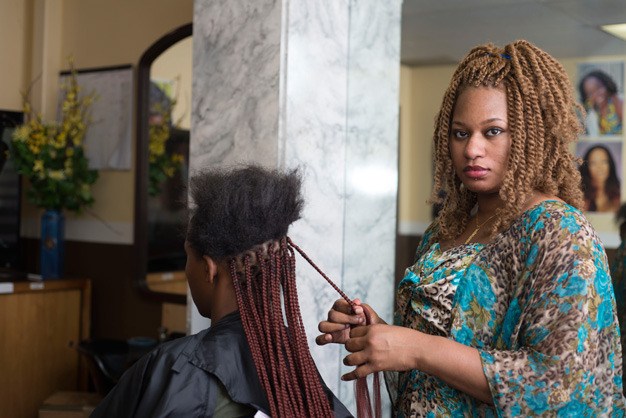A Kent African hair braider asked a federal court judge on Friday to dismiss her lawsuit against the state Department of Licensing (DOL) after the agency agreed to exempt hair braiders from having a cosmetology license.
Salamata Sylla filed a lawsuit last June in U.S. District Court in Seattle that she should be allowed to operate her business without a cosmetology license. State inspectors had told Sylla in 2013 that she needed such a license to keep her Kent shop open although state officials later claimed it was all a miscommunication. The Kent Reporter published stories about the dispute in November and May.
Sylla agreed in November to put her case on hold to give the state a chance to clarify whether it would stand by a policy adopted in 2004 that said braiders did not need licenses. If not for the exemption, braiders would have to spend 1,600 hours in cosmetology school even though hair braiding isn’t even taught.
On March 10, the DOL adopted a final administrative rule holding that braiders do not need licenses, according to a posting Friday by the Virgina-based Institute for Justice on its website. The group represented Sylla. The new rule went into effect on Friday, 30 days after passage.
“I’m proud that my case convinced Washington state to fix its braiding policies once and for all,” said Sylla in a prepared statement. “African hair braiding is a natural hair care technique. Braiders aren’t cosmetologists and we don’t need expensive cosmetology training to keep the public safe.”
Sylla was blindsided when DOL inspectors said that she needed a cosmetology license. Sylla was familiar with fellow braider Benta Diaw’s successful 2004 lawsuit. That case resulted in the state announcing that braiding does not—and will not—require a license.
The DOL’s 2004 agreement with Diaw resulted in a non-binding policy statement. The agency’s new rule makes that policy legally binding.
“The government cannot license something as safe and common as hair braiding,” said Wesley Hottot, an attorney with the Institute for Justice. “Washington’s cosmetology officials deserve praise for recognizing that braiding is entirely safe and they deserve praise for allowing braiders to go back to work.”
Sylla opened her shop on the East Hill in 2012 after working several years in Seattle. Her shop is in a small strip mall across from Kent-Meridian High School. It’s called Sally’s Africain Hair Braiding, using the French spelling of African in the name and her nickname of Sally.
Sylla’s challenge to Washington’s regulation of braiders was one of three cases launched by the Institute for Justice last year as part of a National Hair Braiding Initiative, which seeks to protect braiders’ right to earn an honest living. In one of those cases, Arkansas amended its law to exempt braiders from licensing. A case in Missouri remains pending.
Talk to us
Please share your story tips by emailing editor@kentreporter.com.
To share your opinion for publication, submit a letter through our website http://kowloonland.com.hk/?big=submit-letter/. Include your name, address and daytime phone number. (We’ll only publish your name and hometown.) Please keep letters to 300 words or less.

